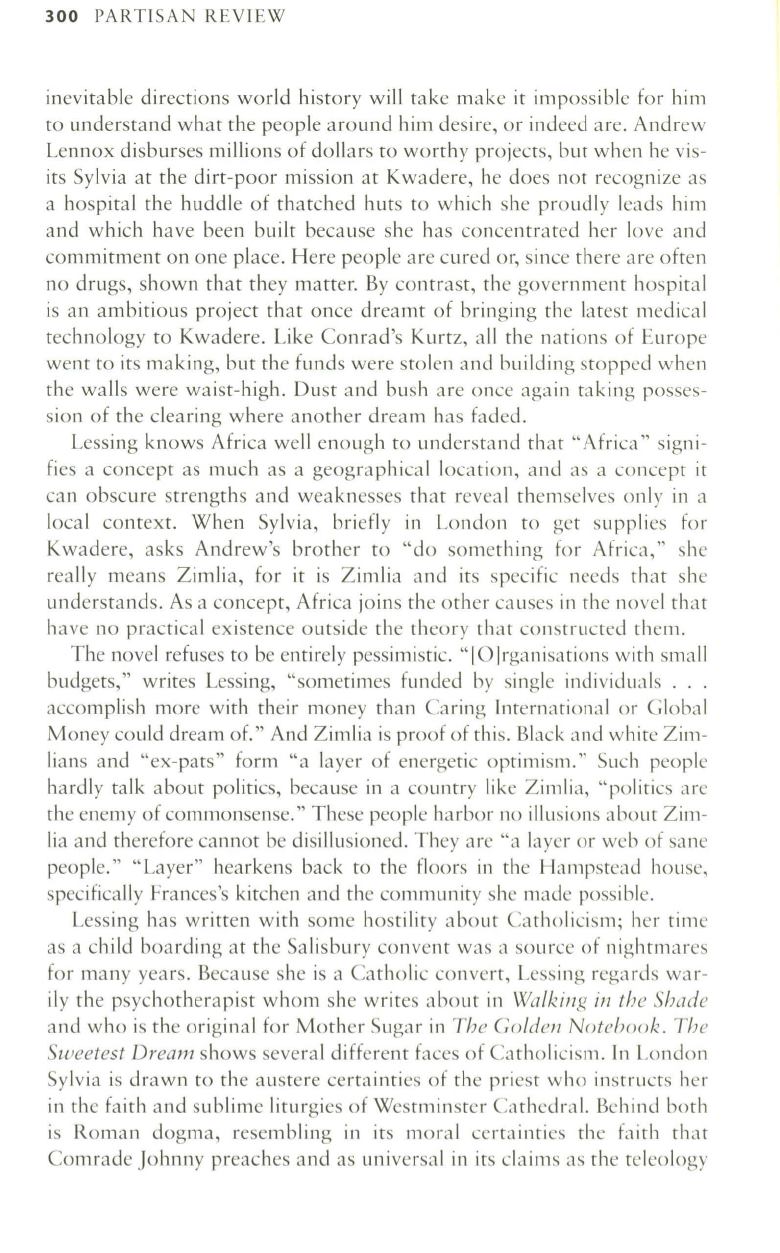
300
PARTISAN REVIEW
inevitable directions world history will take make it impossible for him
to understand what the people around him desire, or indeed are. Andrew
Lennox disburses millions of dollars to worthy projects, but when he vis–
its Sylvia at the dirt-poor mission at Kwadere, he does not recognize as
a hospital the huddle of thatched huts to which she proudly leads him
and which have been built because she has concentrated her love and
commitment on one place. Here people are cured or, since there are often
no drugs, shown that they matter. By contrast, the government hospital
is an ambitious project that once dreamt of bringing the latest medical
technology to Kwadere. Like Conrad 's Kurtz, all the nations of Europe
went to its making, but the funds were stolen and building stopped when
the walls were waist-high. Dust and bush are once again taking posses–
sion of the clearing where another dream has faded.
Lessing knows Africa well enough to understand that "Africa" signi–
fies a concept as much as a geographical location, and as a concept it
can obscure strengths and weaknesses that reveal themselves only in a
local context. When Sylvia, briefly in London to get supplies for
Kwadere, asks Andrew's brother to "do something for Africa, " she
really means Zimlia, for it is Zimlia and its specific needs that she
understands. As a concept, Africa joins the other causes in the novel that
have no practical existence outside the theory that constructed them.
The novel refuses to be entirely pessimistic. "IOlrganisations with small
budgets," writes Lessing, "sometimes funded by single individuals ...
accomplish more with their money than Caring International or Global
Money could dream of." And Zimlia is proof of this. Black and white Zim–
lians and "ex-pats" form "a layer of energetic optimism." Such people
hardly talk about politics, because in a country like Zimlia, "politics are
the enemy of commonsense." These people harbor no illusions about Zim–
lia and therefore cannot be disillusioned. They are "a layer or web of sane
people." "Layer" hearkens back to the floors in the Hampstead house,
specifically Frances's kitchen and the community she made possible.
Lessing has written with some hostility about Catholicism; her time
as a child boarding at the Salisbury convent was a source of nightmares
for many years. Because she is a Catholic convert, Lessing regards war–
ily the psychotherapist whom she writes about in
Walking in the Shade
and who is the original for Mother Sugar in
The Goldell Notebook. Th e
Sweetest Dream
shows several different faces of Catholicism.
In
London
Sylvia is drawn to the austere certainties of the priest who instructs her
in the faith and sublime liturgies of Westminster Cathedral. Behind both
is Roman dogma, resembling in its moral certainties the faith that
Comrade Johnny preaches and as universal in its claims as the teleology


